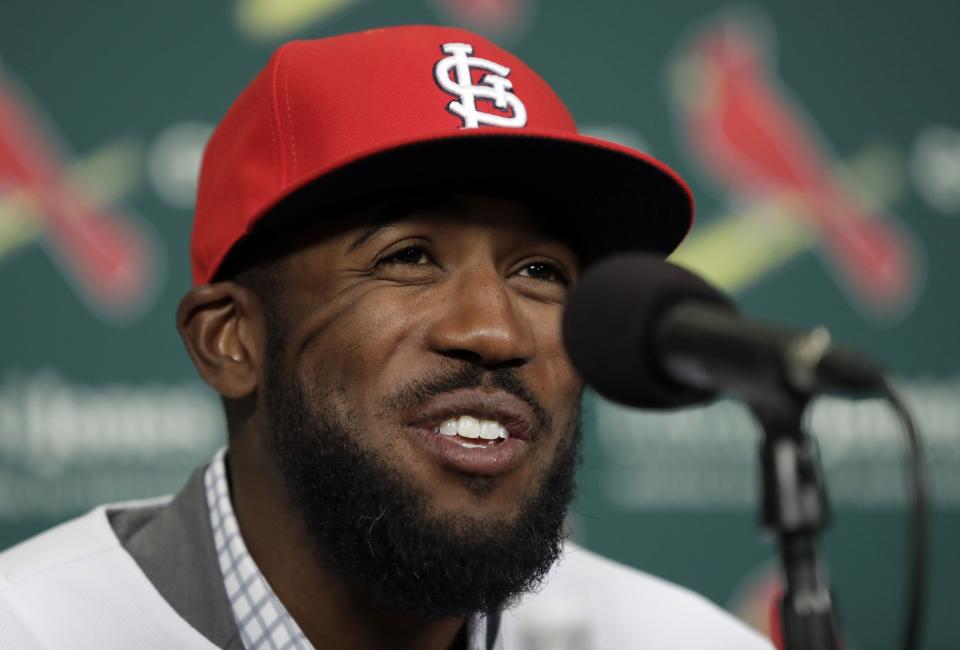Dexter Fowler's $82.5M deal with the Cardinals shows free agency is alive and well
Baseball teams and players see everything through the lens of the new collective bargaining agreement these days, and one consequence of amateur spending restrictions has played itself out as the players hoped: big free-agent contracts. Not only did Dexter Fowler’s five-year, $82.5 million deal from the St. Louis Cardinals come at a surprisingly high cost, it served as an object lesson for how to do business in this climate.
Not every player is Dexter Fowler, of course, a switch-hitting, center field-playing on-base maven coming off the best season of his career and a world championship. Fowler was a free agent last season, too, with a qualifying offer attached to himself just the same, and the offers he received were underwhelming enough that he backed away from a three-year, $35 million deal from Baltimore and went to the Chicago Cubs for a year at $13 million and the option to hit the open market once again.
Betting on oneself is remarkably difficult when the alternative is, you know, tens of millions of dollars. In Fowler’s case, it meant tens of millions more, and it illustrated the power of free agency, typically a drunken-sailor market despite its historical, and historic, inefficiency. Any position player, in particular, that doesn’t do everything he can to reach it at an optimal time is selling himself quite short.
If this sounds easier than it is, well, yeah. Baseball is a remarkably trying game. A swing can disappear. The yips can attack. Guarantees vanish overnight. Elbows can blow (which makes pre-free agency pitching extensions a bit more tolerable). And yet part of the strength of the MLB Players Association is its members’ willingness to shutter those fears and chase something that benefits everyone. Low-ball deals do not. Contracts that buy out free agent years rarely do. Teams are using every last morsel of leverage to keep a player from going to free agency, because the less spent there, the more ownership gets to keep.
It’s why Ian Desmond didn’t panic after turning down a seven-year, $107 million deal in 2014 only to take a one-year, $8 million pillow contract with Texas in 2016. Signing a long-term deal at one’s nadir can be foolish. Desmond refrained and got five years and $70 million to rake in Colorado despite the Rockies giving up the 11th overall pick.
The fear of qualifying offers napalming the free-agent market has been overblown, though Edwin Encarnacion and Jose Bautista find themselves in limbo on account of them and their ages – 34 and 36, respectively. Otherwise, the qualifying-offer candidates either have homes or find themselves in desirable situations.

Closer Kenley Jansen is in the catbird’s seat, with a five-year deal worth at least $80 million on the table from the Miami Marlins, according to sources. Never mind the absolute folly of this, the notion that the Marlins can bullpen their way into contention with a starting staff as flimsy as theirs. It’s a losing strategy to begin with. So, too, is giving a relief pitcher five years, no matter Jansen’s six-year run of dominance. Most egregious of all, perhaps, is offering Jansen nearly the same deal they did Aroldis Chapman despite the draft pick they would forfeit for his 65 or so innings a year. It is the 13th overall pick in the June amateur draft, and teams around baseball value it at somewhere between $12 million and $15 million, according to sources. So, really, their offer for Jansen far exceeds what they proposed to Chapman, whom they preferred in the first place, which they shouldn’t even have done because mediocre teams don’t need $17 million-a-year closers. And this is why one executive said earlier this week: “I wish I could make money betting against the Marlins.”
Mark Trumbo, 31 in a month, is going to wind up somewhere and hit lots of home runs and get paid just fine despite his scarlet QO. Same for Justin Turner, who is 32 but plays a corner-infield position and does so well in a free-agent class and trade market laden with power but lacking stable infield bats. He’s staring at somewhere in the neighborhood of Desmond and Fowler money.
Turner could have signed a contract extension, sure, but he understood free agency is a gift – and that’s something the MLBPA must remind its members as the new agreement unwinds itself on the game. For all the criticism the union took about an international hard cap and a luxury-tax threshold some saw as too low, its fundamental belief in the sanctity of free agency – and the insanity of its market – certainly behooves the major league players it represents. The expectation is that the desire to win will overwhelm whatever penalties the agreement may force on high-spending teams, and free agency will be bigger than it ever has, barreling toward the Bryce Harper-Manny Machado-Clayton Kershaw-led Class of 2018-19.
Those are transformative players, while Dexter Fowler merely was a really good one, and look at what he got. Not just an average of $16.5 million a year but five seasons that will carry him into his mid-30s. It’s a bounty, and of course it is, because it’s free agency, the one thing in baseball that never changes and rarely fails to deliver.

 Yahoo Sports
Yahoo Sports 
